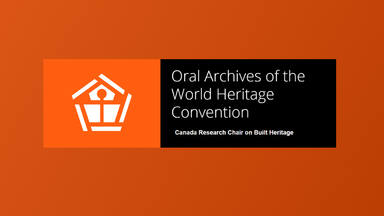
Interview
Robert C. Milne
1935-2012
World Heritage Convention
With a bachelor's degree in zoology from Duke University and a master's degree in ecology from the State University of North Carolina, Rob Milne made his debut at the US National Park Service in 1961. His international career was launched in 1965 when he was sent to Kenya as a warden interpreter in Nairobi National Park for a two-year term.
Upon his return, he co-published Consider the Process of Living (Conservation Foundation) and a film for the Second World Parks Congress in Yellowstone in 1972. He was appointed Head of the Office of International Affairs for the US National Park Service in 1975, a position he held until 1995. A long-time member of the IUCN World Commission on Protected Areas, he also headed the International Seminar for National Parks and Equivalent Reserves between 1973 and 1991. A total of more than 700 park and protected area managers from 108 different countries participated in this program in partnership with the University of Michigan and Parks Canada.
In his role at the National Park Service, Rob Milne was responsible for the implementation of the World Heritage Convention in the United States for twenty years. During this period, he attended almost all of the Committee's meetings. In 1992, during the change of administration from Bush to Clinton, he assumed the chairmanship of the Committee following the resignation of incumbent president Jennifer Salisbury. After his retirement in 1996, he was sent to the World Heritage Centre by the US Government as an advisor to the Director of the Centre. He also carried out occasional monitoring missions to certain threatened sites on behalf of UNESCO.
Interview with
Robert C. Milne
2 March 2009, Paris, France
The following audio excerpts are from an interview in English conducted with Rob Milne by Christina Cameron and Mechtild Rössler the 2 March 2009 at UNESCO headquarters in Paris. There are enlightening details about the first meetings of the World Heritage Committee and the sites inscribed at that time. Rob Milne comments on the work of the various bodies of the World Heritage Convention, namely the Committee, the advisory bodies and the World Heritage Centre, in addition to sharing his original conception of international solidarity.
- 1. The World Heritage Convention
- 1a. Involvement of Robert C. Milne in the World Heritage Convention
- 1b. First sessions of the World Heritage Committee
- 1c. Objectives of the Convention
- 1d. World Heritage List
- 1e. Successes and failures of the Convention
- 2. The World Heritage Committee
- 3. Advisory bodies: IUCN
- 4. The secretariat of UNESCO
- 5. Transboundary sites
- 6. International solidarity
Oral Archives of the
World Heritage Convention
Under the leadership of the Canada Research Chair on Built Heritage at the University of Montreal, an international team of researchers conducts interviews with pioneers of World Heritage to capture memories of important moments in the history of UNESCO Convention.
Launched in 2006, this initiative is part of the UNESCO History project that celebrated the 60th anniversary of the creation of UNESCO. The Oral Archives project records the precious witness of people closely associated with the creation and implementation of the Convention. Their recollections and views have greatly enriched the book by Christina Cameron and Mechtild Rössler, Many Voices, One Vision: The Early Years of the World Heritage Convention (Ashgate/Routledge, 2013).
